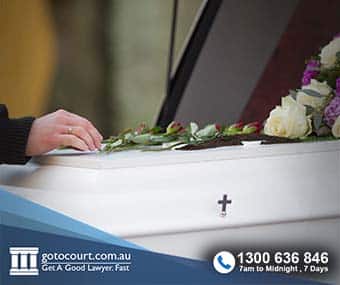Call our lawyers
now
or,
have our lawyers
call you
What Can I Do If I Have Been Left Out Of A Will?
Updated on Oct 10, 2022 • 5 min read • 476 views • Copy Link
What Can I Do If I Have Been Left Out Of A Will?
When a person makes a will in Australia, they can add or remove beneficiaries at any time. However, when a person removes a person from their will, this does not necessarily mean that the person who has been left out of the will cannot eventually receive provision from the deceased estate. There are legal avenues that a disinherited close family member or dependant can use to challenge being left out of a will.
What does it mean to be left out of a will?
When a person is left out of a will, they are said to have been disinherited. A disinherited person is a person who has been deprived of the right to inherit from a close family member or a person on whom they were dependent. If a person is left out of a will, they do not stand to inherit from the estate if the estate is administered according to the terms of the will. In order to inherit from the estate, the person will have to contest the will in court. This can be done successfully if the person can establish that the deceased had an obligation to provide for them.
Why would someone be left out of a will?
A person may be left out of a will because of personal conflict with the testator, or because they have no current contact with them. For instance, a parent might have a disagreement with their adult child over their lifestyle, religion or some other highly emotional issue. This may result in estrangement, with the parent feeling that they are no longer obliged to provide for the child.
Sometimes a testator has a good reason for leaving a family member out of their will.
Aside from the estrangements and ill feelings that can occur between family members, a testator may leave a person out of their will in order to be fair to other parties. For example, a parent who has already given a lot of money or assets to one of their children may feel they should leave their remaining assets to the others.
The law has provisions for these situations. The court will ask what a reasonable testator would have done in the circumstances. If a reasonable testator would have left the person out of the will, then the court will not interfere with the will’s provisions.
I’ve been left out of a will – what can I do?
When a close family member or dependent has been left out of a will, there may still be a way for them to claim fair provision from the deceased estate. Certain categories of relatives and dependents are entitled to make a legal claim against an estate if they have been left out of the will. For example, the New South Wales Succession Act 2006 allows a child or spouse of the deceased, as well as a financial dependent, to bring a Family Provision Application to the Supreme Court of NSW. Other states and territories have similar provisions.
The person making a Family Provision claim will have to show that they were entitled to inherit, that they were wrongfully left out of the will and that they have current and future financial needs that mean that they should receive provision from the estate. The court will consider the claim on its own merits, but it will also consider the impact that making provision would have on the beneficiaries and other claimants. The court’s decision will untilmately depend on what a reasonable testator would have done in the same circumstances.
Equitable proprietary estoppel
A person who has been left out of a will may also seek to reverse their fortunes by making a claim in equitable proprietary estoppel. Importantly, this option is open to those who are not entitled to make a Family Provision claim.
When a person was promised a bequest by another person and the promised gift was not included in the will, they may have grounds for making a claim of equitable proprietary estoppel. This is a claim made in equity (also known as the court of conscience) to protect injured parties who cannot rely on contract law.
This legal action provides recourse for those who have suffered damage because they relied on someone else’s word. For example, in the 2001 NSW Supreme Court decision of Lewis v Lewis & Anor, the court upheld a claim of equitable proprietary estoppel after a testator failed to keep a promise to make a testamentary gift. The court found that the deceased had deliberately made the offer intending that the claimant would rely on the promise.
Am equitable proprietary estoppel claim is more difficult to prove than a Family Provision Claim. The courts have noted that these claims inevitably rely on one person’s recollection of events in circumstances where the deceased cannot give their version of what happened.
In the 2007 Supreme Court of NSW decision of Hyslop v Hyslop; Estate of Joyce Hyslop, it was emphasised that when a party claims they had an agreement with a deceased person, the court will seek corroboration of this. A claimant must establish the following elements:
- That the testator promised the claimant a gift;
- That the claimant relied on the promise;
- That they suffered detriment because they relied on the promise; and
- In the circumstances, it would be unconscionable for the deceased estate not to be bound by the promise.
If the claim is proven, an order can be made that the gift became the claimant’s property in the moment that the promise was made, and it therefore is not an asset of the deceased estate.
If you require legal advice or representation in any legal matter, please contact Go To Court Lawyers.

Affordable Lawyers
Our Go To Court Lawyers will assist you in all areas of law. We specialise in providing legal advice urgently – at the time when you need it most. If you need a lawyer right now, today, we can help you – no matter where you are in Australia.How It Works







1. You speak directly to a lawyer
When you call the Go To Court Legal Hotline, you will be connected directly to a lawyer, every time.


2. Get your legal situation assessed
We determine the best way forward in your legal matter, free of charge. If you want to go ahead and book a face-to-face appointment, we will connect you with a specialist in your local area.


3. We arrange everything as needed
If you want to go ahead and book a fact-to-face appointment, we will connect you with a specialist in your local area no matter where you are and even at very short notice.













